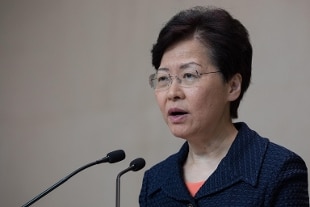- Hong Kong, new clashes and violence between demonstrators and police
- Clashes with protesters in central Hong Kong. Molotov against the police who respond with hydrants
- Hong Kong, thousands defy police bans and take to the streets for democracy
- Hong Kong, arrested human rights leader Joshua Wong. Opponents cancel event
- Hong Kong, new clashes: police shoot gunshots
- Hong Kong: clashes between demonstrators and police, Molotov cocktails
Share
04 September 2019The leader of Hong Kong, Carrie Lam, announced that "the extradition law text has been withdrawn" and the main request of the protesters who for months now upset the former British colony with their protests will be accepted.Carrie Lam appeared on television to announce the formal withdrawal of the extradition law after a meeting with the pro-establishment allies, to whom she had already communicated her decision. Hong Kong media reports. This is a pre-recorded message lasting about seven minutes, broadcast on unified networks. In addition to the withdrawal of the law, however, the establishment of an independent commission on the work of the police would not be envisaged, another crucial request of the anti-government protesters. "The government will formally withdraw the law to fully appease public concerns," the pro-Beijing governor said in the video statement released by her staff. The extradition proposal was presented in April and following the first protests it was only suspended (in June Lam declared it "dead").
No to the amnesty
The Hong Kong leader, however, defines amnesty for protesters who have been arrested since the beginning of the protests against the extradition law reform "unacceptable". A similar request, one of the five put forward by the protesters, "is against the rule of law" and is "against Basic Law", the fundamental law with which Beijing regulates its relationship with the former British colony, Lam said during the of the television message in which he announced the formal withdrawal of the proposal to amend the extradition law.
Skeptical protesters
The demonstrators show skepticism regarding the granting of the administration of the former British colony to the most pressing of their demands. On the Lihkg platform the move was called "too little, too late". Among the participants, writes the South China Morning Post, an independent commission to judge the actions of the police during the protests that caused over 1100 arrests in the former British colony has now become the main request. . So the protest in Hong Kong will not stop even after the withdrawal of the extradition law to China. This was clarified by the organizers of the demonstrations in the streets of the former British colony. For Bonnie Leung, of the Human and Civil Rights Front, the simple renunciation of the law will not be enough because over the months the demands of the protesters have been increasing, and reminds that the crowd wants the resignation of the chief executive Lam, the creation an independent commission to investigate political violence, the cancellation of the riot charge for arrested protesters, political reforms and democratic elections.
The president of Cathay Pacific resigns
Meanwhile, the president of Cathay Pacific, John Slosar, has resigned from the leadership of the airline company involved in the anti-government protests taking place in Hong Kong since the beginning of last June. The group reported in a note on the Hong Kong Stock Exchange. Slosar, 62, will be replaced by Patrick Healy, 53, also like Slosar, manager of the Swire Pacific real estate group, after the board meeting of the airline scheduled for 6 November next. Last month, the group's CEO, Rupert Hogg, had resigned under pressure from Beijing. "Slosar's resignation is due to his retirement," reads the statement broadcast by Cathay Pacific. Slosar's farewell comes after a tumultuous month for the company, hit by protests in Hong Kong due to its conflicting positions. Initially, the national airline of Hong Kong showed tolerance, if not solidarity, with the protesters. So much so that several employees took part in the protests. But faced with the risk of boycott threatened by Beijing, the main customer, the company has taken a very tough position. The protesters accused Cathay Pacific of resorting to "white terror" after the dismissal of twenty members of the group, including pilots and crew, who had supported anti-government protests. Among them was the union hostess leader, Rebecca Sy, who had complained that she was fired without motivation after Cathay Pacific executives viewed her Facebook page. In a note to employees, cited by the South China Morning Post, Cathay Pacific had also opened the possibility of unpaid leave or reduction of working hours due to the economic damage caused by protests that had been underway for months.

